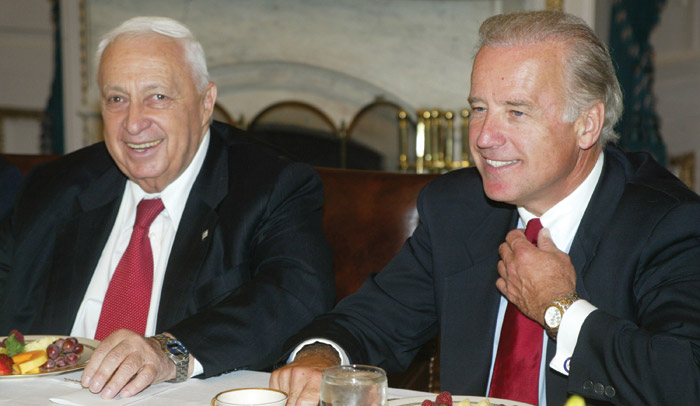
On the morning of March 4, as Americans were dissecting the returns from the Super Tuesday elections, Israelis were scratching their heads, awaiting final-final results. Israel’s election was held on March 2. Prime Minister Benjamin Netanyahu was declared the winner.
But there is more than one type of winner in a parliamentary election.
There is a winner with 61 seats (a majority), a winner with 60 seats (a tie) and a winner with 59 seats (a surprisingly strong minority). Netanyahu was the winner because the other camp, led by the Blue and White party, declined and failed to build a robust alternative. Yet the final results matter because one seat, a few thousand votes, a fraction of a percentage could be the difference between a relatively easy path to government and a tough negotiation — even an unsurmountable peak. Yes, Netanyahu was victorious, but that doesn’t mean a fourth election is out of the question. He still needs to form a coalition; his win — unless a final-final tally proves otherwise — does not ensure such a thing.
[For update on the state of the race read: Election Handbook: Netanyahu won, but it is still complicated]
He won by radicalizing his message. He leveled more personal attacks on his rivals, and pointed more fingers at the “leftist” media and the “biased” legal system. A few days before election day, a recording revealed that one of his advisers believed the main glue in Netanyahu’s camp of supporters is anger and hate.
One wonders if Americans feel the same about their electorate. President Donald Trump’s voters? Candidate Bernie Sanders’ voters? They seem angry, don’t they?
There are limits to human attention, even in the age of multitasking. The past week pushed those of us who try to keep up with political news in both the United States and Israel to the limit.
In both cases, a charismatic, anti-establishment, controversial leader was trying to seal the political deal. In both cases, the opponent was a somewhat gray, uncharismatic-yet-decent leader.
On Feb. 27, a recording made in secret revealed that the senior adviser to Benny Gantz thought his candidate was incompetent. Boom. On Feb. 28, that adviser was fired. The final polls were published, suggesting a slight rise for Likud. On Feb. 29, former vice president and Democratic presidential candidate Joe Biden won big in South Carolina, revitalizing his bid. Another recording surfaced, this time of Netanyahu’s aide badmouthing his own voters. Trump rallied a crowd with a vicious depiction of “Mini Mike” (Bloomberg). Netanyahu said Gantz, his own appointee, was a mediocre Israel Defense Forces (IDF) chief of staff.
On March 1, Israel’s ambassador to the United Nations Danny Danon called Sanders “a liar, an ignorant fool, or both” at the annual AIPAC Policy Conference in Washington, D.C. Sanders’ response: “I am not anti-Israel.” Pete Buttigieg dropped out of the presidential race. Another recording. Netanyahu was caught lying about his involvement in producing the Gantz recording. Biden raised $10 million in two days. On March 2, Israel voted. Democratic presidential candidate Amy Klobuchar dropped out of the race and endorsed Biden, who suddenly is seen as the person who can stop Sanders. On March 3, 14 states voted and began to tally the ballots.
Now, mental exhaustion has set in. “Our brains do have the ability to process the information we take in, but at a cost,” psychologist and neuroscientist Daniel Levitin wrote in his 2015 bestseller “The Organized Mind: Thinking Straight in the Age of Information Overload.” What is the cost he talks about? “We can have trouble separating the trivial from the important, and all this information processing makes us tired.”
After such a week, we are entitled to be tired.

It is tempting to compare Israel’s March 2 election with America’s Super Tuesday. In both cases, a charismatic, anti-establishment, controversial leader was trying to seal the political deal. In both cases, the opponent was a somewhat gray, uncharismatic-yet-decent leader. “Sleepy Joe” — Trump’s depiction of Biden — could remind us of “Benny-chuta” — an IDF nickname for Blue and White leader Gantz, whose translation would be something like “Easygoing Benny.”
True believers follow Netanyahu and Sanders. Less-committed skeptics follow Gantz and Biden (or former New York Mayor Mike Bloomberg, if you think he still has a chance). Netanyahu and Sanders ride on the cult of personality; Gantz and Biden attempt to push back against it. One votes for Gantz if he or she doesn’t want Netanyahu; one votes for Biden to stop Sanders. Netanyahu and Sanders excite a radical base; Gantz and Biden attempt to arouse a lethargic mainstream. Sanders and Netanyahu are older than Biden and Gantz, yet often they appear younger and more energetic.
Of course, there are many differences between these two candidates. Netanyahu has his party, Likud, under total control. Having decidedly won a primary contest just a few months ago against a formidable challenger, Gideon Saar, Netanyahu eliminated — for now — all talk of possible successors. His electoral success on March 2 made any thought of pushing him aside unrealistic. Sanders, an independent, is far from having any such stature. He is fighting to take over a party whose majority of voters doesn’t yet want him as its leader. He is fighting against a party establishment that is highly skeptical of him. There is also a fear that he might be too left-leaning to beat Trump. For him, this past week was a warning sign he might have peaked too soon.
Yes, Netanyahu was victorious, but that doesn’t mean a fourth election is out of the question.
Netanyahu has vast experience as a leader of a complicated country. According to conservative New York Times columnist David Brooks, Sanders is a former “useless House member” and “marginal senator.” Netanyahu is a staunch capitalist while Sanders calls himself a socialist. Netanyahu believes in power; Sanders vouches for equality. No sane observer expects these two to get along in the event they serve their respective countries as leaders. Netanyahu protested when his domestic opponents compared him with Turkish President Recep Tayyip Erdogan. Sanders went much further and called Netanyahu a “reactionary racist.”
Does Netanyahu hold racist views? No, but he often directs his political messages against Israel’s minority, Arab voters and their representatives. The new book “The Secrets of Netanyahu’s Charisma” by Kaveh Shafran, a top Israeli media consultant, shows how Netanyahu uses the same move time and again to win a majority. The prime minister repeatedly ties the “left” to the “Arabs,” making it almost illegitimate to vote for a real left.
In the mid-1990s, when he was Israel’s prime minister for the first time, Netanyahu was vilified when he was caught on camera whispering to an elderly rabbi that “the left forgot what it is to be Jewish.” The second part of the whisper is less famous but no less important. The left, said Netanyahu, is willing to “place our security in Arab hands.” So from 1996, when he was first elected, to 2020, when he is fighting to stay in power, Netanyahu turned this message into “a kind of routine,” as the book about him says.
In a previous election, his last-minute call that the Arabs are “flocking to the polls” seemed to have done the trick and rallied his supporters. In the March 2 election, it was not a last-minute call but rather a consistent and deliberate campaign to tie Blue and White to the Arab Joint List. The race, the Likud campaign argued, was not one of “Bibi or Benny,” it was one of “Bibi or Tibi.”
Ahmad Tibi is the most visible and well-known Arab member of the Knesset. If it is Bibi or him, the choice for most voters is obvious. Internal surveys of Blue and White found this Likud campaign effective and the reason for Likud’s surge in the final days of the campaign. They rushed Gantz to use any stage to refute the allegation that he aims to form a coalition based on the support of the Arab party.
It didn’t help much. The campaign was effective for two reasons:
Jewish Israelis recognize a coalition based on Arab support is problematic. This isn’t because the Arabs are Arabs; it is because they’re opposed to some of the foundational pillars of Israel’s being, and because their political tendencies will make it impossible for a government to execute core security missions, such as retaliating with force to rockets from Gaza.
Most voters, including those who think Netanyahu’s tone was nasty and his use of divisive language unacceptable, understood he was right. Denials notwithstanding, Blue and White had no realistic path to a coalition other than one that included Arab support. These voters looked at street signs showing a former IDF chief of staff placed against the background of Tibi and the Palestinian flag, and got the message. It was ugly — and effective.
[Bibi] won by radicalizing his message. He leveled more personal attacks on his rivals, and pointed more fingers at the “leftist” media and the “biased” legal system.
Netanyahu benefited from attacking the Arab Joint List; ironically, the other beneficiary is, well, the Arab Joint List. In the past year, it’s grown from one election to the next, signaling an important development — possibly the beginning of Arab involvement in national politics. As voters flock to elect Arab members of the Knesset, the expectations of voters gradually will alter the priorities of these leaders. The party still will be a sideshow, but perhaps one more invested in political compromises that would benefit both the Arab constituency and Israel.
Amid the talk about left and right, it’s easy to forget that in Israel, the political game is not one of left versus right. If that was the case, the right would beat the left fair and square in every election without even having to sweat it, as self-defined leftists in Israel (left plus center-left Jews) comprise barely 15% of the vote.
In fact, Gantz voters are mostly right (15%), center-right (33%) and center (27%). Not left. Those who support Avigdor Lieberman, who vowed not to sit with Netanyahu, are right (48%), center-right (26%) and center (22%). Netanyahu calls them “left,” and his proof is their possible alliance with the Arabs. He calls them “left” because the left, in the eyes of the Jewish right (approximately 60% of Jews are right or center-right), is a group of people that “hate other Jews,” are “traitors,” “sanctimonious” and “love Arabs.”

Not that the left has nicer things to say about the right. The left sees the right as “corrupt,” “aggressive,” “fanatic” and “stupid.” Then again, the left is small; the right is large. The game is played between a right, a center-right and a center. What remains of the left is the seven seats of a merged Labor and Meretz. Had they not merged, one of them, if not both, would be completely gone.
So what have the center and the right been fighting about for a whole year? Netanyahu. Should he or should he not remain prime minister? And of course, Netanyahu, to his supporters, is the symbol of the changing of the guard, the proof Israel is no longer controlled by the old elites of secular, Ashkenazi, labor movement groups. For his opponents, he is the epitome of a majority gone wild by losing its desire for unity and moderation.
Netanyahu has been the dominant politician in Israel for the past quarter of a century. You would think that by now, he would relax, become more conciliatory, less combative. But that hasn’t happened. He feels persecuted — maybe he is persecuted — by his rivals. He feels mistreated — maybe he is mistreated — by the old guard, who never gave him a chance. He is convinced the establishment plots — maybe it does — against him. He calculates his only real weapon for fighting back is the people. So he must pit the people against the establishment. He must sow rage to reap victories.
If the Democratic Party chooses to nominate Sanders, the 2020 U.S. election will be much more ferocious than Israel’s election.
The wrathful candidate is not a stranger to the American voter. The United States has a raging president and at least one raging candidate on the Democratic side. If the Democratic Party chooses to nominate Sanders, the 2020 U.S. election will be much more ferocious than Israel’s election. In Israel, Netanyahu mastered the tactics of rage, while Gantz attempted to carve a more restrained path. He tried to make his restraint an electoral asset by appealing to those who no longer want the politics of maliciousness to dominate their lives.
A last-minute scandal on the last day of the campaign clarified why Netanyahu keeps doing what he does the way he does. As I mentioned before, one of his long-time advisers, known for lurid behavior and wily tactics — he was forced to resign as bureau chief in 2012 amid allegations of sexual misconduct — was recorded explaining to another person that Netanyahu’s supporters “hate everything.” He argued “hate is what unites” the right-wing camp. Netanyahu was quick to condemn the words of his loyal aide, but the words stuck. They stuck for the same reason the campaign targeting Blue and White and the Arab Party stuck. The voters know there is truth to what was said: “Now, in this public, I’ll call it … non-Ashkenazi .… What gets them worked up? Why do they hate the press? … They hate everything and we’ve succeeded in whipping up that hatred.”
The most damaging aspect of the statement by the aide, Natan Eshel, referred to Sephardic Jews as a herd devoid of sense and disposed to hate. This was ironic because it is usually the parties on the center-left — the parties whose voters tend to be educated, urban and Ashkenazi — who time and again make derogatory comments against the supposedly uneducated, superstitious, primitive and, well, non-Ashkenazi voters of the other camp. When leaders to the left of Likud make such comments, Netanyahu and his allies are quick to utilize them as fuel for the low-burning fire of social and ethnic grievances. When one of their own makes such comments, they have a problem for which the only remedy is a fast rebuke and change of subject.
Luckily for Likud, subjects flood the fray at a nauseating pace. A day before the Eshel recording surfaced, the country learned about the Bachar recording — on which Israel Bachar, a senior adviser to Gantz, called his candidate a “danger to Israel” and described him as incompetent. Few in Israel seriously question Gantz’s decency and good intentions, but the polls demonstrated the question of competence and readiness for the top job as an obstacle for him. More Israelis are convinced Netanyahu is “more fit” to be prime minister than Gantz. This gap explains some of Gantz’s political troubles. It explains how a candidate slated to appear in court on March 17 facing charges of bribery, fraud and breach of trust was able to master a comeback. He will be the first sitting prime minister to sit for a criminal trial.
A last-minute scandal on the last day of the campaign clarified why Netanyahu keeps doing what he does the way he does.
Netanyahu is 70 years old. Biden and Sanders are much older. Just a few weeks ago, one could hope these leaders would never have to face off against each other, that Democratic voters would opt for a candidate who is younger, less experienced, more moderate. Or maybe just more moderate and less critical of Israel’s policies. That Israeli voters would signal to the next American administration, if it is Democratic, that a new beginning, a clean slate, is an option.
It is now more likely Netanyahu will be there, awaiting the victor of the 2020 election. It is now more likely Trump will be reelected or Israel and the U.S. will be on a collision course. A milder collision if Biden wins; a more violent one if Sanders wins. American Jews, as recent polls show, will not save Israelis from such a fate. Most of them don’t regard Israel as an important issue in an election. Most of them prefer Biden over Sanders, but would end up voting for Sanders in a matchup against Trump. Israeli Jews also will not save us from such a fate. Most of them didn’t think about this looming prospect of a collision as they cast their vote for a candidate whom a possible future American president calls a “racist.” And if they did think about it, this probably made them more prone to vote for Netanyahu. An eye for an eye, a raging man for a raging man, a populist for a populist, a Netanyahu for a Sanders (or a Trump).
Shmuel Rosner is senior political editor. You can read more analysis of Israeli and international politics like this at The Jewish Journal.






















 More news and opinions than at a Shabbat dinner, right in your inbox.
More news and opinions than at a Shabbat dinner, right in your inbox.